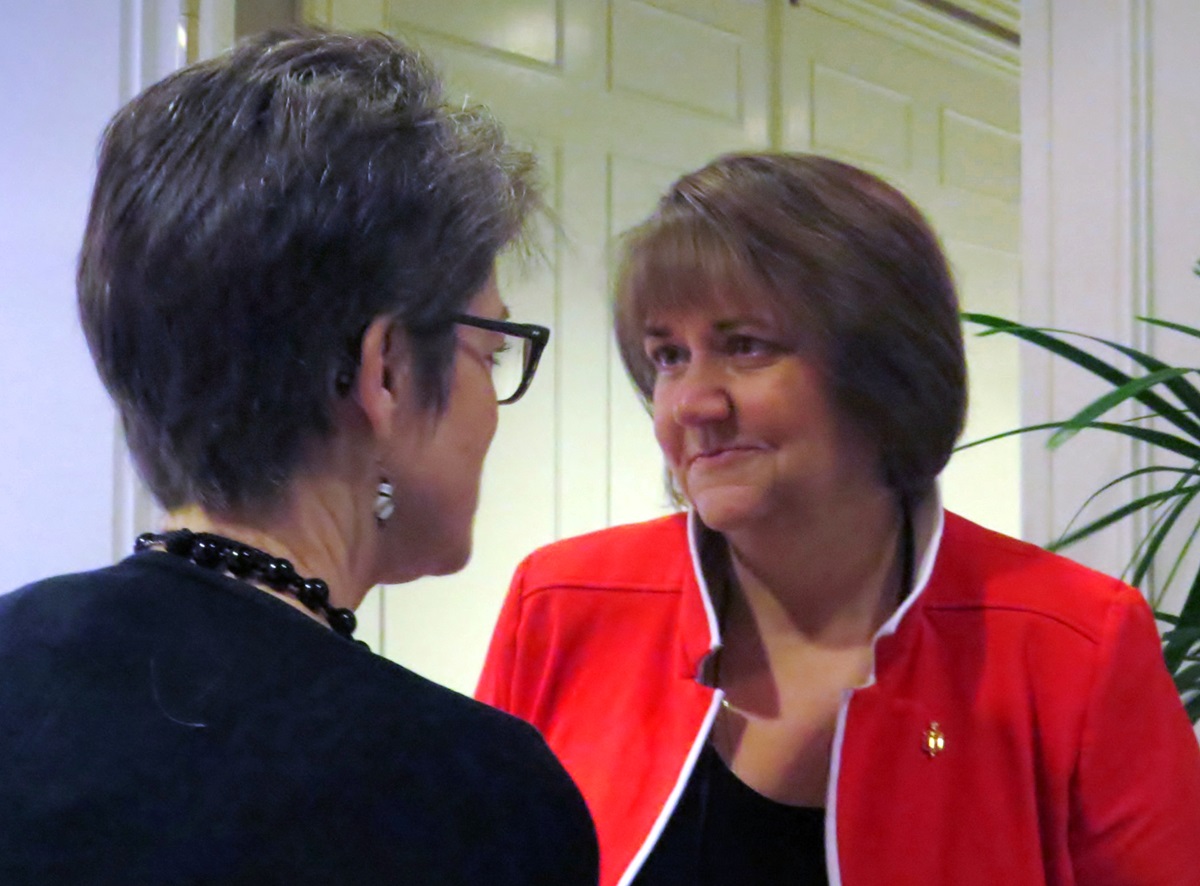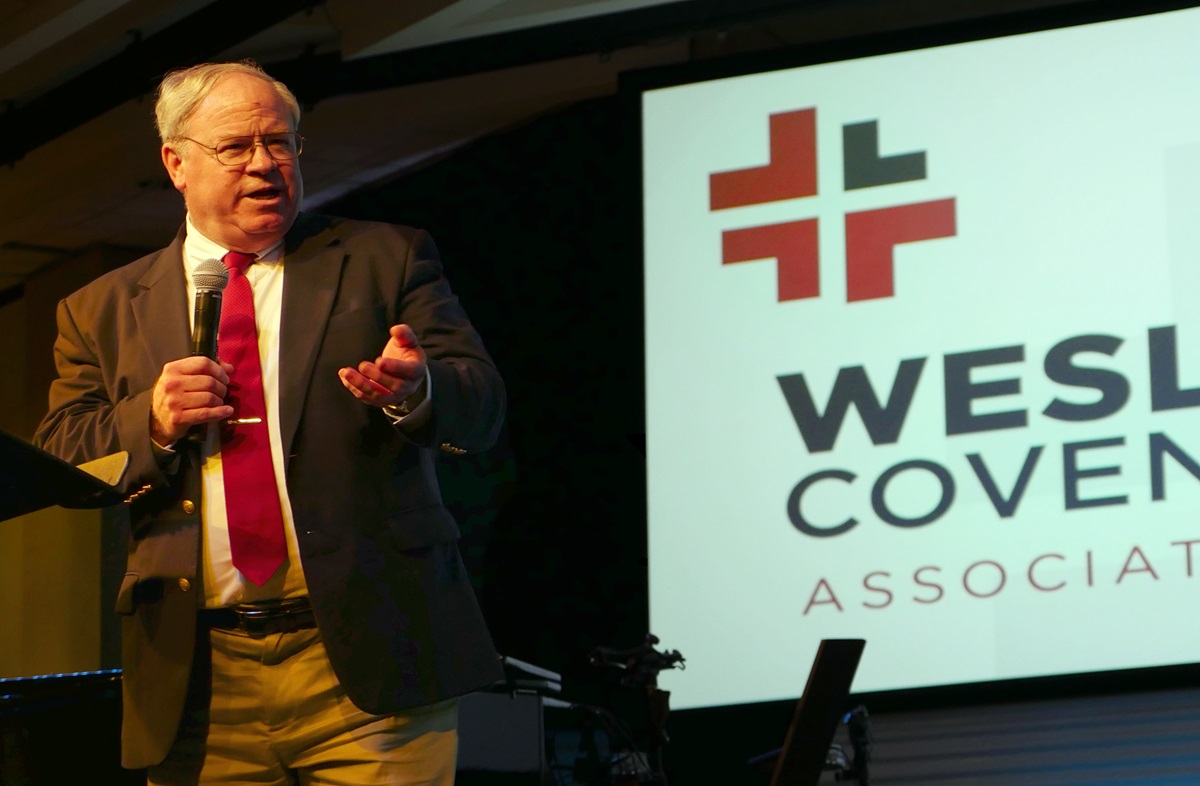At the end of the day, Bishop Karen Oliveto remains bishop of the Mountain Sky Area even after The United Methodist Church’s top court ruled consecrating a gay bishop violates church law.
Judicial Council said in Decision 1341 the bishop would still be in “good standing” until an administrative or judicial process is completed.
“It has been a very stressful time of waiting — waiting for clarity. And I’m very excited that I get to continue to do the job God has called me to do and that the community has affirmed — and that we get to return to the Mountain Sky Area to work with clergy and laity there,” Oliveto told United Methodist News Service. She was at the Council of Bishops’ meeting in Dallas.
The decision is being greeted with confusion, but also with hope that the Commission on a Way Forward has time to do its work on finding a path to unity.
“We acknowledge that the decision does not help to ease the disagreements, impatience and anxiety that permeates The United Methodist Church over the matter of human sexuality, and particularly this case,” said Bishop Bruce R. Ough, president of the Council of Bishops.
“Our compassion and prayers of intercession extend to all those who are hurt, relieved, confused or fearful,” he said.
Officials in the U.S. Western Jurisdiction consecrated Oliveto as a bishop on July 16, 2016. She leads the Mountain Sky Area, which encompasses Colorado, Montana, Utah, Wyoming and one church in Idaho.
“God has put a vision on our hearts, and we get to continue to build beloved community there,” Oliveto said.
Dixie Brewster, the lay South Central Jurisdiction delegate who brought the petition asking about a gay bishop’s election, said she was pleased with the decision and thankful to the Judicial Council.
“It gives us specific and faithful direction in determining our future as United Methodists,” she said.
While she expressed disappointment that Oliveto remains a bishop, she said she understands that the church allows fair process. “My prayer is that Oliveto will step down and not create further division within the church,” Brewster said.
Bishops from the Western Jurisdiction said in a statement that the ruling reinforces the reality that The United Methodist Church is not of one mind about the inclusion of LGBTQ people.
“While the Judicial Council ordered a review of Bishop Oliveto’s qualifications for ministry, the Western Jurisdiction is already in the process of responding to complaints that were filed after her election. This process will continue according to the provisions of our Book of Discipline,” the bishops said.
Bishop Grant Hagiya, who is president of the Western College of Bishops and a member of the Commission on a Way Forward, said the college is working with “due diligence” on complaints filed against Oliveto.
“We’re not trying to skirt this or defy the church,” said Hagiya, who leads the California-Pacific Conference. “We’re following every procedural step in the Discipline for the complaints that come forward.”
Two groups who advocate for the current church teachings on homosexuality expressed skepticism that the Western Jurisdiction would follow through on complaints against Oliveto.
“This decision confirms what we know, which is that The United Methodist Church is broken,” the Rev. Rob Renfroe, president of Good News, told United Methodist News Service.
“We don’t have any hope — because of its past track record — that the Western Jurisdiction College of Bishops will address this either swiftly or with integrity.”
If that is the outcome, he said, the Way Forward Commission, must take into account “that we are at least two different churches and that some kind of compromise that cobbles us together …is not going to work as a way forward.”
The Rev. Keith Boyette, who represented Brewster before the Judicial Council and formerly served on the church court, was attending a Memphis, Tennessee, gathering of the Wesleyan Covenant Association when the ruling came down. Boyette is the newly named president of the WCA.
The group, which considers current church teachings on homosexuality part of Christian orthodoxy, issued a statement in October that the church should prepare for a split if those rules are changed.
Boyette stressed the importance of the Judicial Council establishing that a public record of a same-sex marriage serves as a self-avowal of homosexuality and likely indicates a person is “practicing.”
The executive director of Reconciling Ministries Network, a group that has worked to overturn church teachings on homosexuality, also does not expect Oliveto’s removal.
“Given the strong leadership in this jurisdiction, it seems highly unlikely she will be removed from her ministry as a result of a trial,” Matt Berryman wrote in a blog.
Berryman, who is also a member of the Way Forward Commission, wrote that it could be argued the rulings are “practically meaningless,” depending on the actions of individuals and committees moving forward.
Greater Northwest Area Bishop Elaine Stanovsky, spokesperson for the Western Jurisdiction College of Bishops, spoke to the complexity of the decision.
“We thank the Judicial Council for allowing the Commission on A Way Forward to do its work. We have said from the beginning that we trust the commission to find new ways for United Methodists of varying perspective to live and serve God together,” she said.
Sierra Leone Bishop John K. Yambasu said it was "right" for the Judicial Council to decide that Oliveto's consecration violates church law. But he was glad the matter goes back to the Western Jurisdiction College of Bishops for supervisory response, rather than resulting in immediate removal of Oliveto as bishop.
Her immediate removal would have created "more wounds" in the church, he said.
"This decision will give us time — maybe to pray over our situations and to talk to one another," Yambasu said.
The Rev. Jerry Kulah, general coordinator of the Africa Initiative, also welcomed the ruling.
“The decision has not gotten us to where we ought to be as a church, but begins the process of ensuring that we, as clergy, are held accountable for our stewardship,” said Kulah, who has been a delegate to General Conference.
He noted that the central conferences of Africa, along with many United Methodists around the globe, have been praying and fasting for the work of the Judicial Council and the Council of Bishops. The Africa Initiative, an unofficial movement of African clergy and lay leaders formed prior to General Conference 2012, issued a call for prayer and fasting earlier this month.
And while many United Methodists around the world may disagree on sexuality and other issues, Kulah said all can commit to “working together harmoniously for the common good.”
Kulah believes the decision provides some degree of clarity and direction for the Commission on a Way Forward for making proposals the General Conference that would “ensure the continued unity, and sustainable growth and development of global Methodism.”
Florida Conference Bishop Ken Carter, one of the moderators of the Way Forward Commission, called the decision “significant.” But he did not see it as impeding the commission.
“The work of the commission is, to me, longer term work that’s more holistic and seeking to really find a way forward that encompasses a lot of the different responses and is not so focused on a person or supervisory issues,” Carter said.
“This is significant, I don’t want to belittle it, but it is significant for the shorter term,” he said of the Judicial Council decision. “What the General Conference does in 2019 and 2020 will really shape the church and really be the church’s response to both understandings of LGBTQ identity.”
Lonnie Brooks, a lay member of the Alaska Conference who wrote a brief supporting the Western Jurisdiction, sees it differently.
“I fully believe that this decision will increase the pressure on the commission to propose a plan of separation to General Conference when it convenes in special session,” Brooks said. The bishops, on the same day as the oral arguments in this case, called the special General Conference to be Feb. 23-26 in the St. Louis Convention Center.
Irene R. DeMaris, an advocate for inclusion within the denomination and lead organizer of the Laity Letter, described the moment when Oliveto was elected as “holy.”
“As I reflect today about the ruling, I am disappointed, but hopeful that the Western Jurisdiction College of Bishops continues to stand with Bishop Oliveto. Bishop Oliveto has proven herself a great bishop in less than a year and the church needs her prophetic witness.”
Gilbert is a multimedia report for United Methodist News Service. Sam Hodges, Heather Hahn, Linda Bloom and Vicki Brown all contributed to this story. Contact her at 615-742-5470 or newsdesk@umcom.org. To read more United Methodist news, subscribe to the free Daily or Weekly Digests.
Like what you're reading? Support the ministry of UM News! Your support ensures the latest denominational news, dynamic stories and informative articles will continue to connect our global community. Make a tax-deductible donation at ResourceUMC.org/GiveUMCom.





